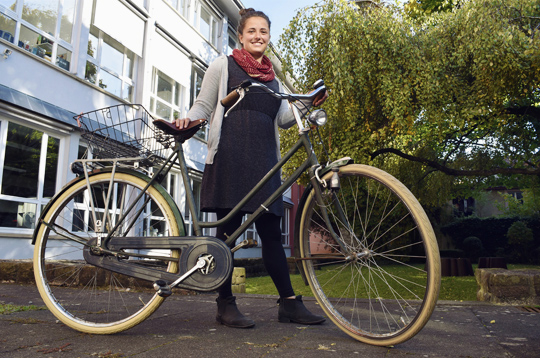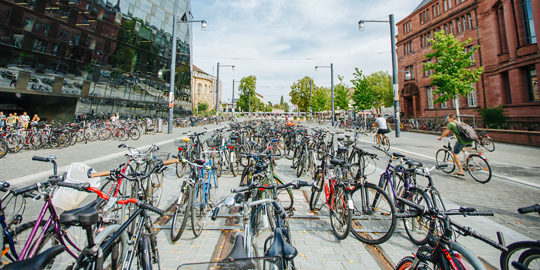Opening up cycling options
Freiburg, Oct 06, 2017
A raining morning in Freiburg. The sky is gray, rain is pouring down, and the ground is covered in puddles. Who wants to cycle to uni on a day like this? The thing to do is get out of the rain - with a leap onto the arriving tram.

Luisa Stenmans and her bike are a good team. But she wishes Freiburg could have a public bike-sharing system. Photo: Thomas Kunz
In the afternoon, after one’s last lecture, the world looks very different. The sun is shining through the colored leaves, the air is pleasantly clear, birds are singing, and Freiburg in autumn feels like a wonderful place. How nice it would be now to not have to get into a crowded tram, squashed in between people, bags, and shopping - just waiting for your stop! But if you don’t cycle there in the morning, you don’t have a bike with which to cycle back. Or do you?
Student Luisa Stenmans of the University of Freiburg has completed a Master's thesis in Environmental Sciences outlining a concept for a system of public bike sharing. It would allow Freiburgers to borrow bikes spontaneously at 60 points around the city. The bikes could be returned to any of those points or - depending on how it’s eventually implemented - to other public locations. “The advantage is that you don’t have to worry about how you get the bike back to the place it came from,” Stenmans says. “That can be helpful in various situations.”
Reaching the largest number of target groups
The starting point for the plan was an online survey. Stenmans wanted to find out if there was even an interest in bike sharing. In a second step, she created maps with which she could work out where bike-sharing points could be useful in Freiburg. “The first thing you think of is of course public transport stops. Commuters there could use the bikes.” But it would also make sense to put bike sharing points around the university campus and near the town square, so as to reach as many potential users as possible.

Many students get to university by bike - so a bike-share point at the Universitätszentrum could make sense. Photo: Sandra Meyndt
“A bike-sharing system doesn’t aim to replace your own bike,” Stenmans explains. “Rather, it’s about creating complementary opportunities.” Stenmans herself couldn’t imagine her life without her Dutch bike. But it would be practical in many situations to be able to borrow a bike on the spur of the moment, and to be able to return it somewhere else. “For instance, when I take the train to another city and don’t want to leave my bike parked here at the station - it would be great if I could borrow a bike for that short journey. Or if I have visitors and we want to go somewhere but I have only one bike.” Partygoers and night owls could benefit from bike sharing too. They could use the city’s bikes to get into town of an evening and take a taxi home at night - without having to pick up a bike next morning.
Good examples
Bike-sharing schemes have been introduced successfully in places like Cologne and Birmingham (UK). Stenmans has spoken with the organizers and suppliers and has found that many of the success factors identified could be applied to Freiburg. “Freiburg is already very pro-bike. And the size of the city plays a key role. It could be possible to meet the needs of the whole urban area with relatively few bike-sharing points.” In order for everyone to benefit the costs would have to remain low. Stenmans says the optimal system would use a subscription or travel pass solution. She adds that alongside the conventional city bikes, the scheme should also be able to meet special needs with transport bikes, child seats, or trailers.
But it is not yet clear if Freiburg is to adopt a public bike-sharing system. A decision is expected in November 2017.
Julia Dannehl

